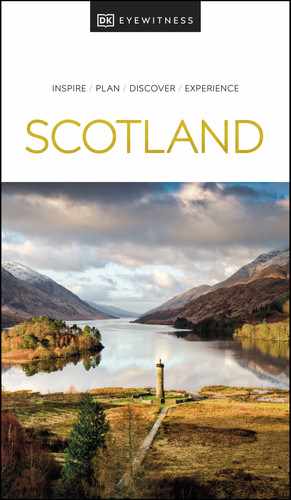SCOTTISH
SPIRIT
No special occasion is complete without a dram of the drink that is the pure essence of Scotland. Although global brands have industrialized whisky-making, their dominance is being challenged by artisan distilleries that produce exciting new malts using age-old skills. Meanwhile, new distillers are creating gins and other spirits such as rum, vodka and absinthe.
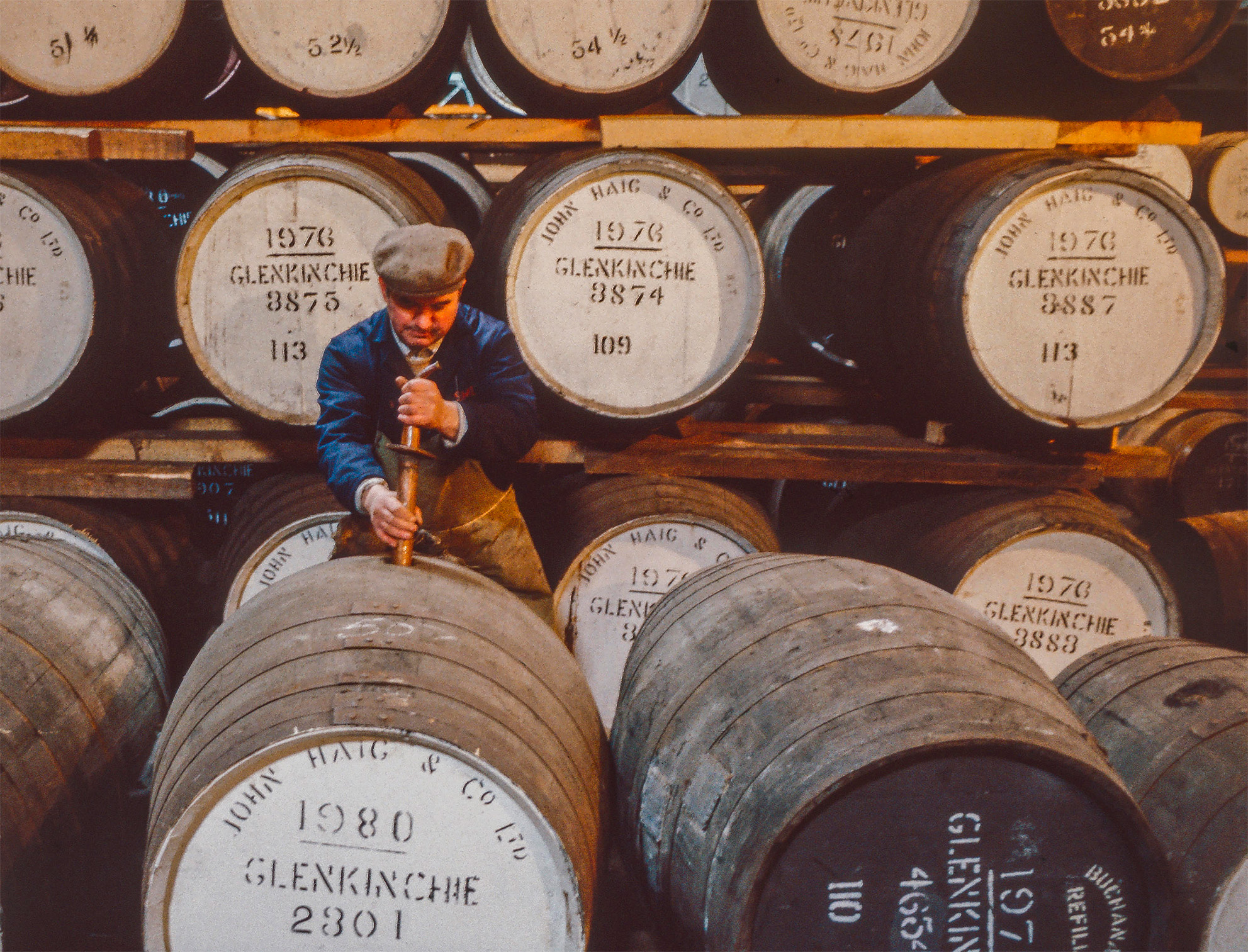
t Casks at the Glenkinchie distillery, a long-standing whisky producer
Lowland Whiskies
Lowland whiskies tend to be smooth and their palate gentle. Until recently lowland distilleries were few and far between, but new ones are cropping up, many producing spirits that replicate the light, grassy style of the region.
What to try: Glenkinchie is made near Edinburgh, while Auchentoshan is triple-distilled in Clydebank. Bladnoch, in tiny Wigtown, is Scotland’s most southerly distillery.
Speyside Malts
Many of Scotland’s famous malt whiskies come from Speyside, where distillers claim there is a perfect balance of climate, terrain and water from Highland springs.
What to try: Glenlivet and Glenfiddich, matured in Bourbon casks to give them notes of light vanilla and orchard fruits, or sherry-matured, Macallan, the “Rolls Royce of single malts”, has notes of dried fruits and sweet spices. Don’t miss a visit to the Macallan distillery as part of The Malt Whisky Trail® in Speyside.
Highland Malts
Due to the Highlands’ vast and diverse terrain, its single malts can vary considerably. Some are rich and full-bodied, others sweet and fruity.
What to try: Glenmorangie, Scotland’s biggest-selling single malt, is light and flowery taste, while Edradour makes a minty, creamy whisky.
New Make Spirits and Gins
Gin has become Scotland’s trendy tipple of choice alongside “new make” spirits that side-step the ageing process of traditional whisky production.
What to try: Rascally Liquor at Annandale Distillery or go on a “gin jolley” at Pickering’s in Edinburgh’s Summerhall.
Island Malts
The malt whiskies of the Hebrides are redolent of heather and peat smoke, while some claim to detect a hint of seaweed and iodine in some island malts. For many they are an acquired taste.
What to try: Islay malts like Laphroaig, Lagavulin and Bowmore, Tobermory from Mull and Talisker from Skye.
Did You Know?
Whisky stored in casks evaporates at a rate of around 2% per year. This is called the “angels’ share”.
The Big Big Gin Festival
This award-winning festival in Edinburgh celebrates all things pertaining to this much-loved libation, from old-school favourites to the latest innovations. Sample gins from some of Scotland’s leading makers and craft gin distilleries, and enjoy the show as mixologists prepare colourful concoctions with flare and gusto at the cocktail bar. You can even take part in a restorative Yin Yoga class to cure the hangover (bigbigginfestival.com).
DISCOVER Scotland Your Way
Whisky Production in Scotland

t Rows of copper pot stills
Whisky is to the Scots what champagne is to the French, and a visit to Scotland would not be complete without sampling this fiery, heart-warming spirit. Scotland has many distilleries producing highly rated single malt whiskies, a title that is revered by true whisky connoisseurs. All malt whiskies are produced using much the same process, but the environment, maturity and storage of the whisky have such a strong bearing on its character that every one is a different experience. There is no “best” malt whisky – some are suited to drinking at bedtime, others as an aperitif.
How Whisky is Made
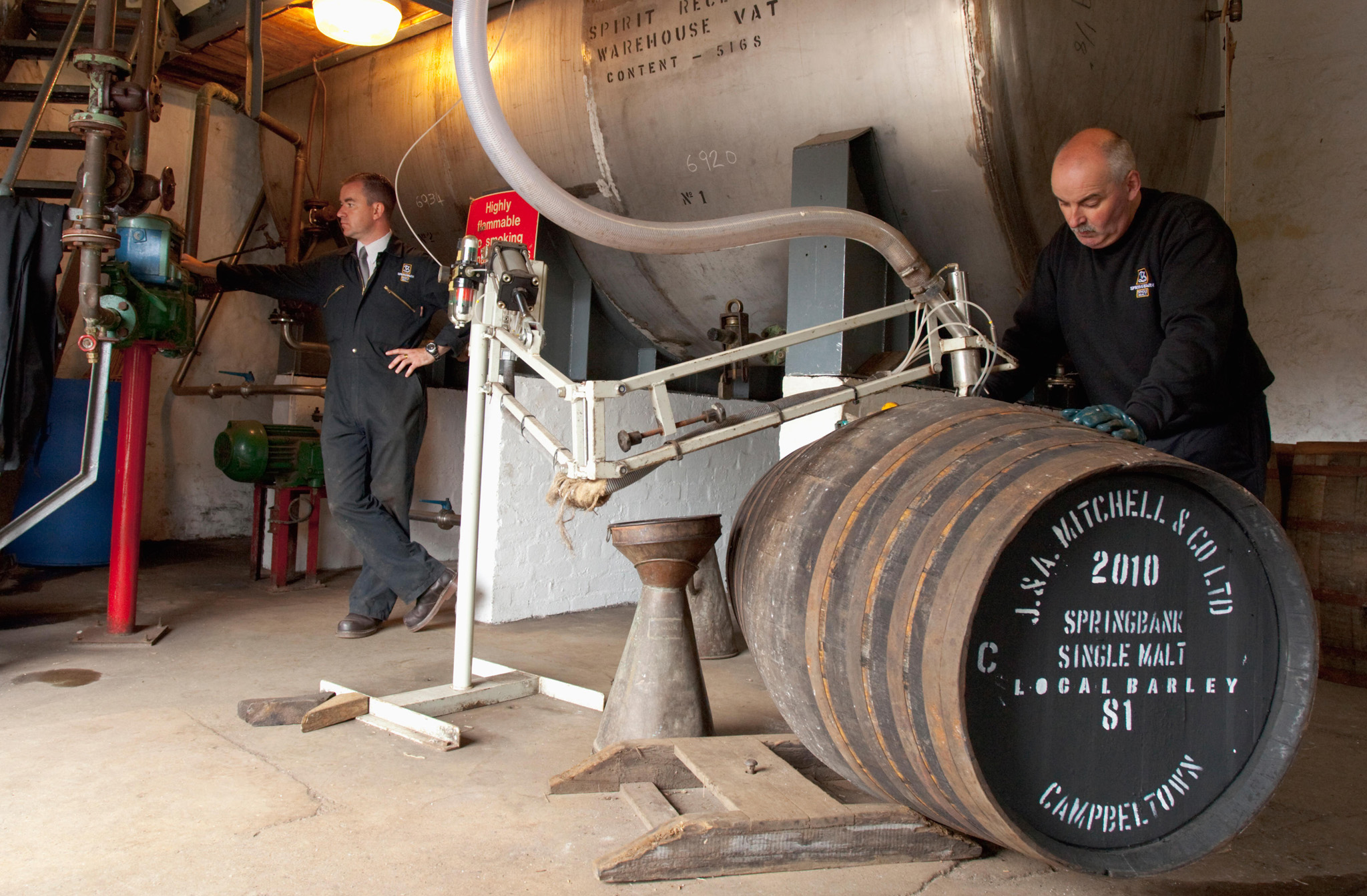
t Oak casks in Glenfiddich distillery, producer of the world’s best-selling single malt whisky
Traditionally made from just barley, yeast and stream water, Scottish whisky (from the Gaelic usquebaugh , or the “water of life”) takes a little over three weeks to produce, though it must be given at least three years to mature, usually in oak casks. The art of blending, pioneered in Edinburgh in the 1860s, became so popular that very little single malt whisky was drunk outside the Highlands until the 1980s when the original vintages were rediscovered and have since regained widespread popularity.

Insider Tip
Anything Goes
Traditionalists may scoff, but whisky is a drink to be enjoyed. So whether that be straight up, on the rocks, with a drop of water, or mixed in a cocktail – Sláinte!
DISCOVER Scotland Your Way
Making Whisky |
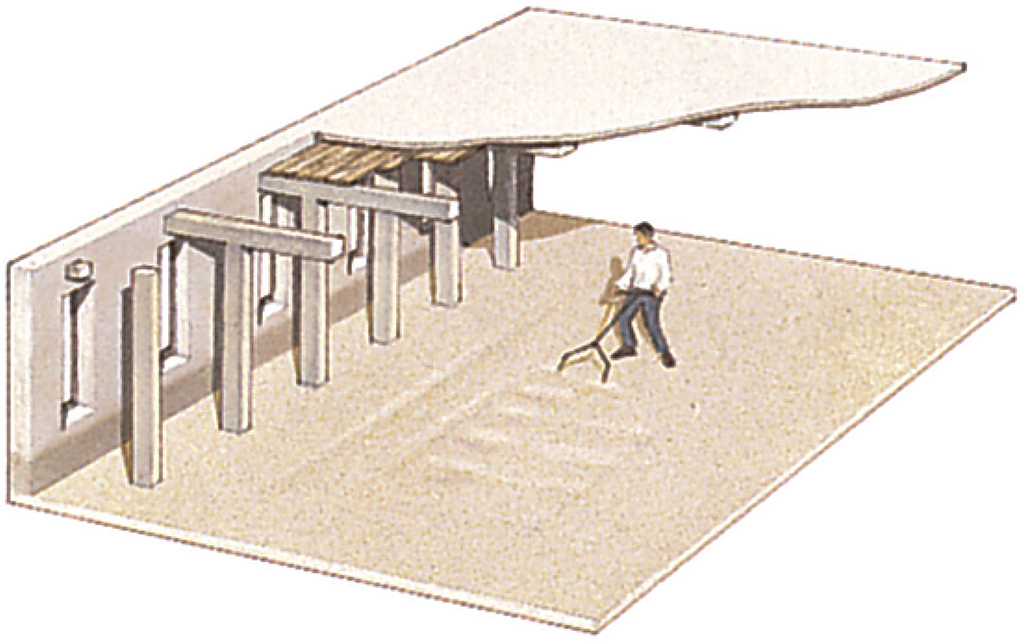
Malting is the first stage. Barley grain is soaked in water and spread on the malting floor. With regular turning, the grain germinates, producing a “green malt”. Germination stimulates the production of enzymes which turn the starches into fermentable sugars. |
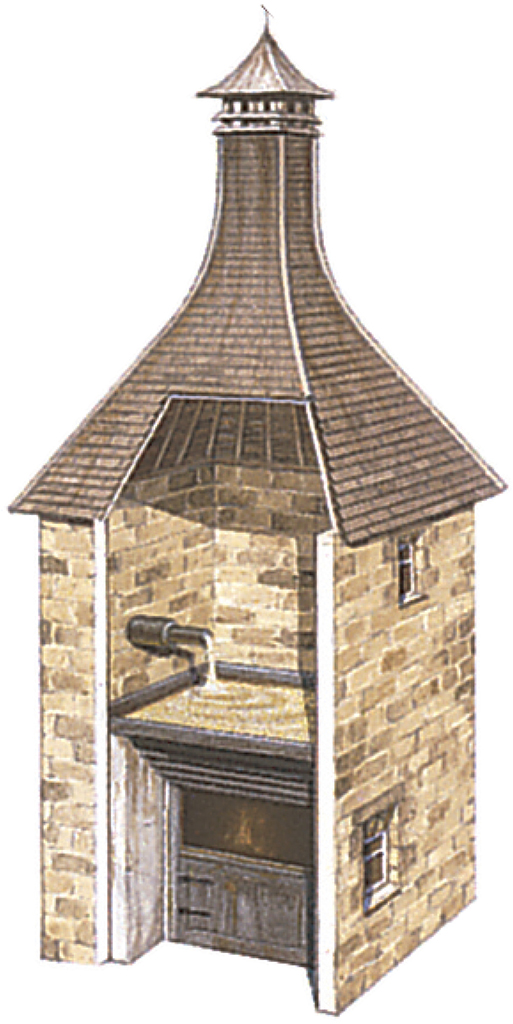
Drying of the barley halts germination after 12 days of malting. This is done over a peat fire in a pagoda-shaped malt-kiln. The peat-smoke gives flavour to the malt and eventually to the mature whisky. The malt is gleaned of germinated roots and then milled. |

Mashing of the ground malt, or “grist”, occurs in a large vat or “mash tun”, which holds a vast quantity of hot water. The malt is soaked and begins to dissolve, producing a sugary solution called “wort”, which is then cooled and extracted for fermentation. |
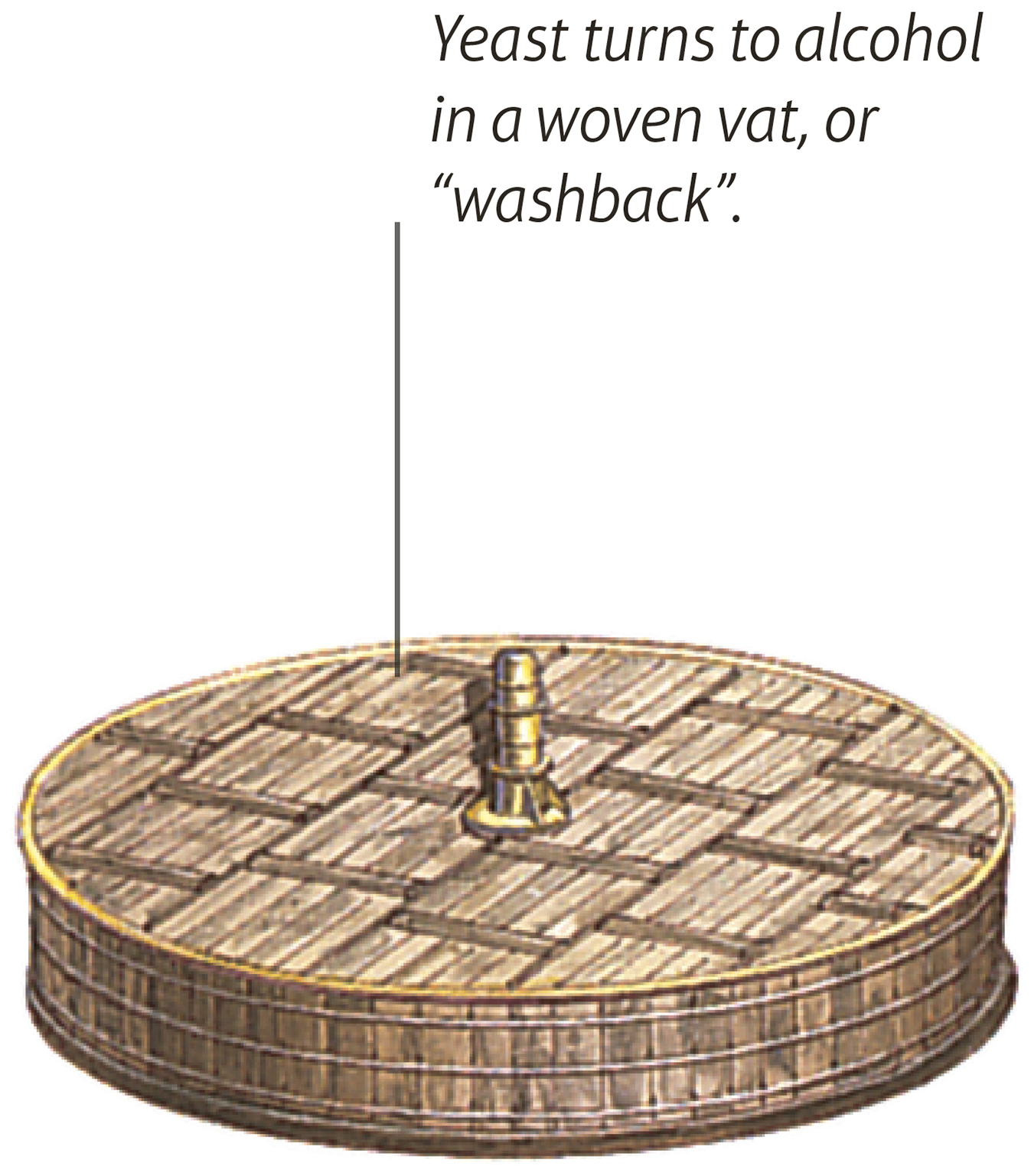
Fermentation occurs when yeast is added to the cooled wort in wooden vats, or “washbacks”. The mixture is stirred for hours as the yeast turns the sugar into alcohol, producing a clear liquid called “wash”, ready for distillation to remove impurities. |
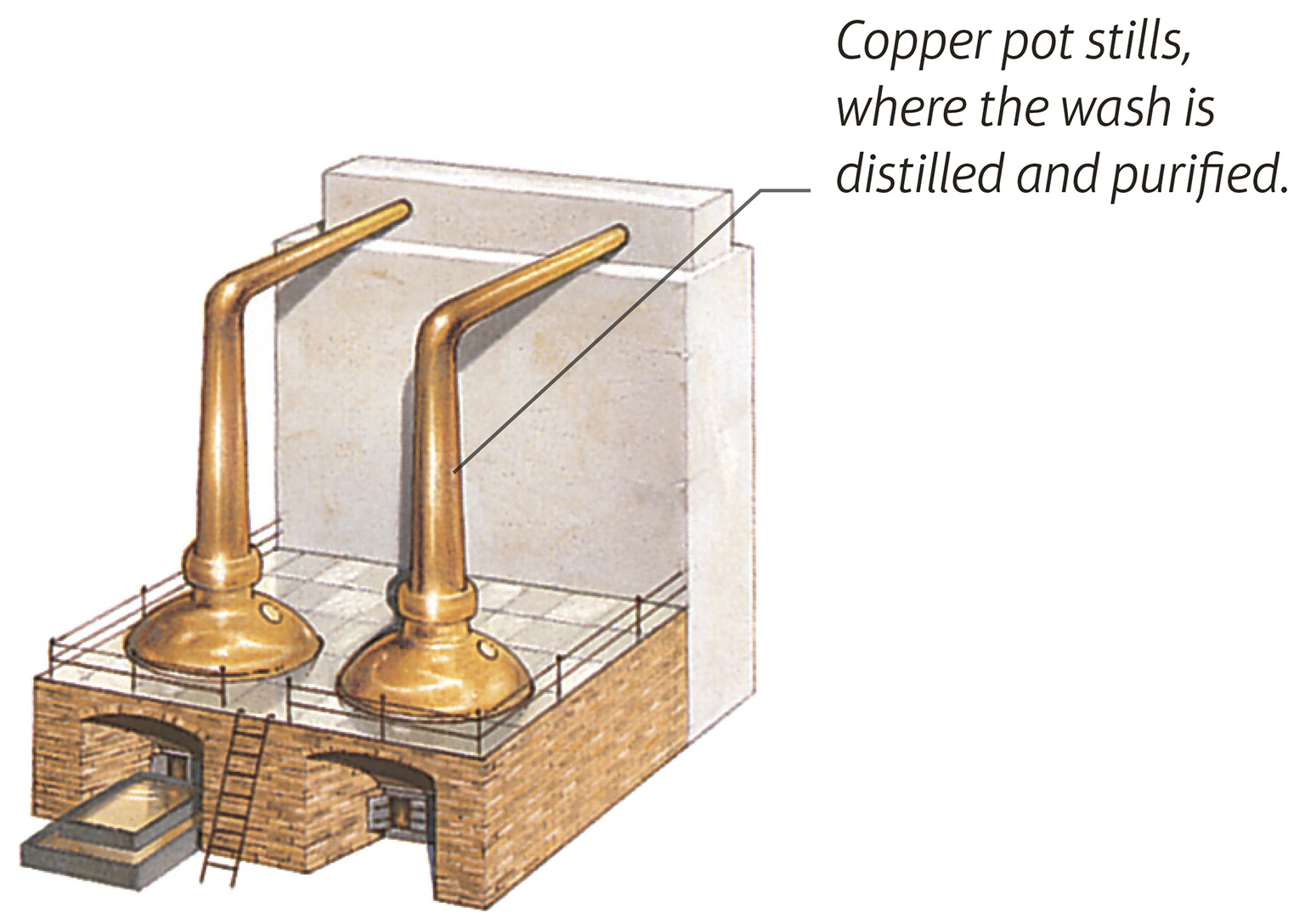
Distillation involves boiling the wash twice so that the alcohol vaporizes and condenses. In copper “pot stills”, the wash is distilled – first in the “wash still”, then in the “spirit still”. Now purified, with an alcohol content of 57 per cent, the result is young whisky. |

Maturation is the final process. The whisky mellows in oak casks that have held sherry, whisky or other wines, for a legal minimum of three years. Premium brands give the whisky a 10- to 15-year maturation, though some are given up to 50 years. |
